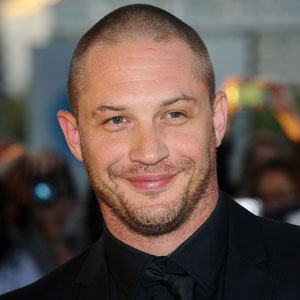'Lawless' Actors Tom Hardy And Guy Pearce: It's The Script â And Money!
Tom Hardy and Guy Pearce are teaming up in Lawless, a film about the infamous Bondurant brothers who led a bootlegging operation in Depression-era Virginia. Directed by John Hillcoat and featuring an all-star cast that includes Mia Wasikowska, Dane DeHaan, Jessica Chastain and Gary Oldman, Lawless left the 65th Annual Cannes Film Festival buzzing about Oscar nominations.
Hardy was born and raised in London where he studied at the Drama Centre London. Hardy is often typecast as a hyper-masculine figure owing to his chiseled features. So it is not surprising that he won a modeling competition when he was 21. This led to his first television role in the HBO-BBC mini series, Band of Brothers, in which he played a United States Army private. Hardy’s first feature film debut was in Ridley Scott’s Black Hawk Down, but it wasn’t until 2009 that he received his first starring role as the title character in Bronson, where he had to gain 42 pounds of muscle. In the last few years, Hardy has become a rising star, garnering roles in mega box office hits such as Inception, Tinker Tailor Soldier Spy and The Dark Knight Rises.
Pearce is also an English actor who moved to Australia with his mother, who ran a deer farm. Prior to film acting, Pearce was a competitive body builder and practiced fencing. He performed in many theater productions when he was younger which led to his on screen acting career. His first major film role was in The Adventures of Priscilla Queen of the Desert, in which he portrayed a drag queen who heads on an epic journey through the Outback. Pearce achieved film success and has gone on to star in well-known films such as L.A. Confidential, Rules of Engagement, The Count of Monte Cristo and his frighteningly realistic performance as Andy Warhol in Factory Girl with Sienna Miller as Edie Sedgwick.
For Lawless, Hardy and Pearce collaborated with the eminent screenwriter Nick Cave, who previously fronted the band Nick Cave and the Bad Seed. "There’s something brutally honest about him," Pearce told Uinterview exclusively. "He’s a no-bullshit kind of guy, really. That comes through. The thing I’m always interested in with Nick is how easy his poetry comes to the surface, because he is obviously so poetic."
GUY PEARCE: Every writer’s different. He has a particular insight that is incredibly evocative. The other writers are evocative, as well, but there’s something brutally honest about him. He’s a no-bullshit kind of guy, really. That comes through. The thing I’m always interested in with Nick is how easy his poetry comes to the surface, because he is obviously so poetic. He doesn’t necessarily present that. He presents more of a rebellious character, in a way.
PEARCE: No, he’s always said, ‘I’m not a musician, I’m not a musician.’ But he knows he’s a musician. But even as a songwriter and after all these years of writing songs, I think he sees himself as a storyteller. And to call himself a musician…. I don’t think he’s ever felt like a great player or a great singer necessarily, even though we all know he’s fascinating and actually really interesting. I think ultimately he knows he’s come from the word, more than anything else. So it’s interesting working in films of his: we all know his songs, it’s like reading an extended version of his songs.
PEARCE: We are extremely popular. [laughs]
HARDY: Sometimes, sometimes….
HARDY: Yes, but that's with everything, though. Commitment, you know? I used to be late, but I turn up. I have a problem with tardiness that I can't control. It's about control. I don't feel safe. The preparation, security - it's about being in a safe place to create what we do.
PEARCE: It’s a number of things. It’s the big three, usually, isn’t it? It’s the character, the script, and the director. And, any kind of…. HARDY [interrupting]: Money! Extra zeros.
PEARCE: Money, yes. Sometimes it’s easier than others. I’ll go backwards and forwards on things, or sometimes I’ll be really close to saying yes, and I’ll tell them that I’m about to say yes, and then I say, ‘Actually, no. I’ve thought about this for two months now, and it’s just not for me. I’m sorry.’
HARDY: Of course, mate. You’re not doing it to a person, you’re weighing your options. You’re here to live. You have to sit with things and see how they affect you, and you have to start a conversation. It’s like a deal, there is no deal that is finite — except probably death. You can get out of anything pretty much. That’s why we have a crew of lawyers. The conversation starts, and then they could stop it with you. PEARCE: Or they’ll say, ‘Actually, we couldn’t get the funding with you, so we’re actually gonna go to Brad [Pitt] now.’
HARDY: Is it nice to know that your fridge is full when you go home? Yes, it is.
RELATED ARTICLES
Get the most-revealing celebrity conversations with the uInterview podcast!








Leave a comment